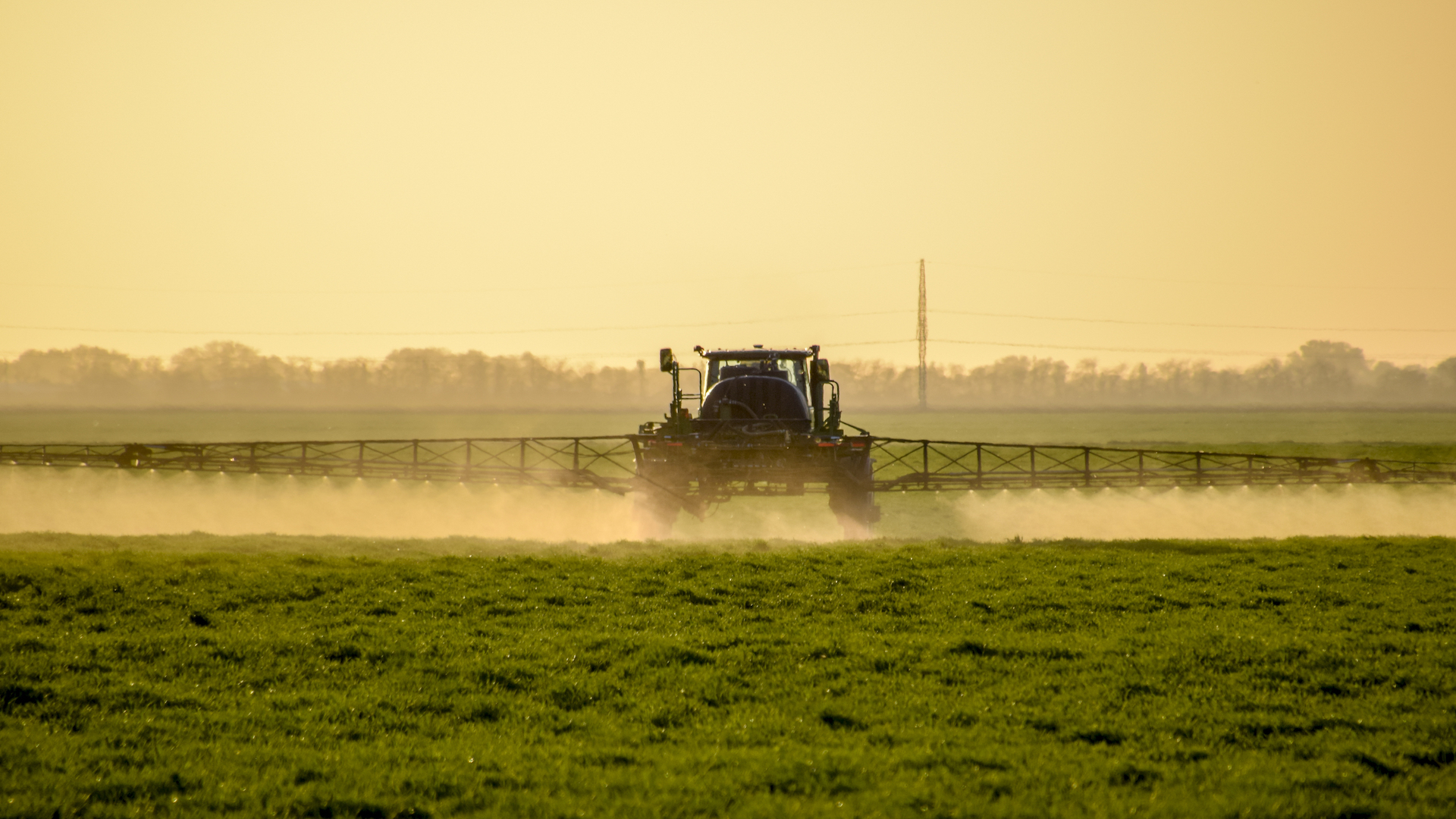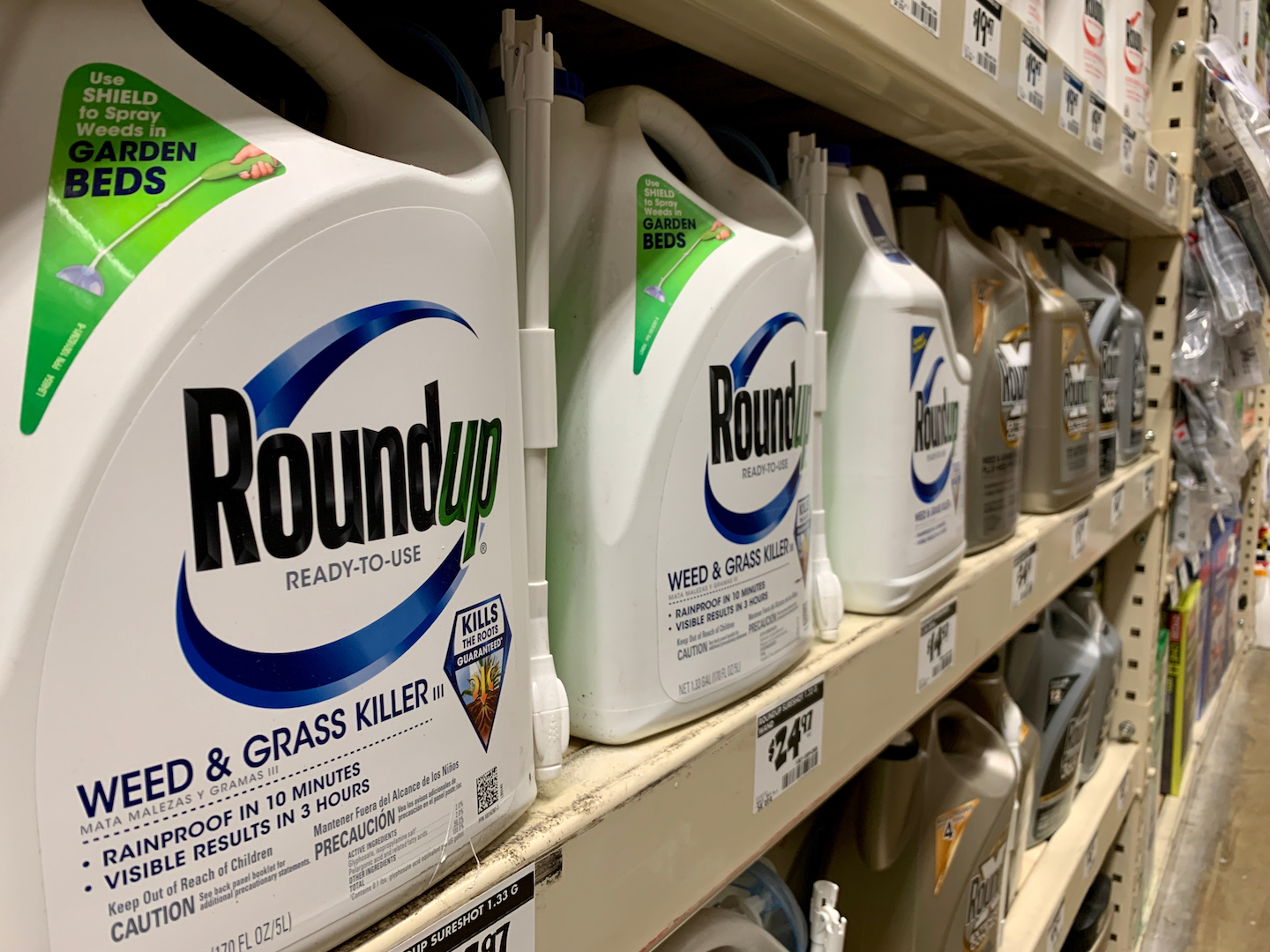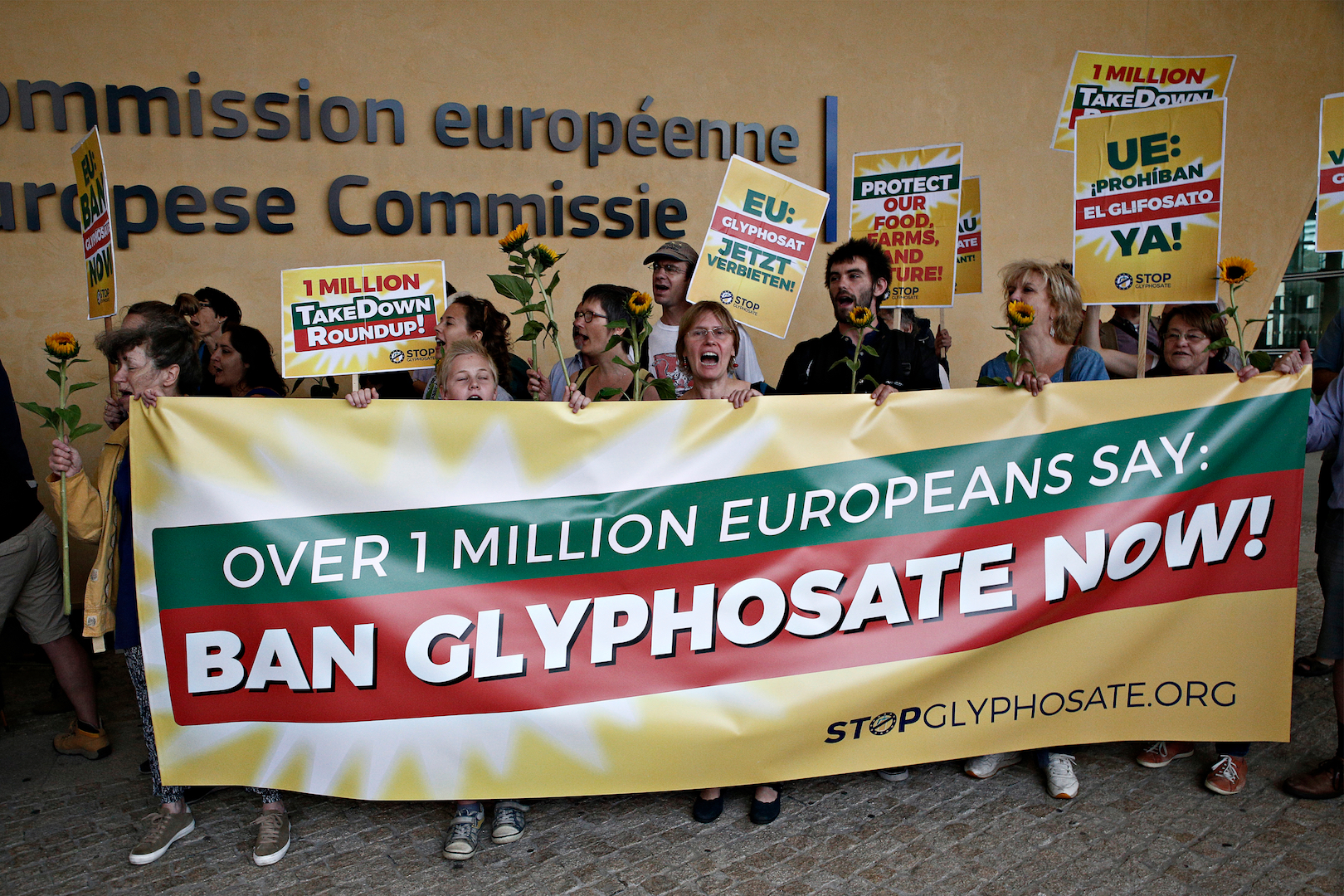What is glyphosate?
Glyphosate is a powerful herbicide. It's also the subject of several multibillion dollar lawsuits by people who claim it gave them cancer.

Glyphosate is a chemical compound that works as an effective herbicide, or weed killer. It's the most commonly used herbicide chemical in the world, according to a 2016 study in the journal Environmental Sciences Europe. Glyphosate may be sprayed anywhere there are unwanted plants — from commercial farms to private backyards.
Who invented glyphosate?
Why you can trust Live Science
Henri Martin, a Swiss chemist, was the first to synthesize glyphosate while trying to develop new pharmaceuticals in 1950, according to a review in the journal Pest Management Science. But the chemical didn't have much use in the pharmaceutical world.
Twenty years later, John E Franz, a chemist at the agrochemical company Monsanto, independently synthesized glyphosate after his colleagues found that chemicals similar to glyphosate were slightly harmful to plants. Franz found that glyphosate was a highly efficient plant-killer. Monsanto promptly patented the chemical and began selling its glyphosate herbicide under the trade name Roundup in 1974.
Roundup took off in popularity when Monsanto began to sell "Roundup-ready" crops in 1996. These plants, which included soybeans and corn, are genetically modified to survive being sprayed with Roundup. Between 1995 and 2014, global glyphosate use grew 12-fold, according to the 2016 study published in Environmental Sciences Europe.
Monsanto's patent on glyphosate expired in 2000, making the product available for other companies to sell. Today, there are hundreds of glyphosate herbicides on the market.

What is glyphosate used for? And how does it work?
Glyphosate is most commonly used in agriculture, the Environmental Sciences Europe study found. Farmers use the practical herbicide to kill weeds that compete with crops for sunlight, water and soil nutrients. Glyphosate has been used more than any other agriculture chemical, with an estimated 8.6 billion kilograms (19 billion lbs.) of it sprayed since 1974 to help grow everything from peppers to oranges.
When the chemical is sprayed onto a plant, it usually seeps into the plant via the leaves, said Ramdas Kanissery, a weed scientist at the University of Florida in Immokalee, Florida. From there, glyphosate can travel from cell to cell and spread to the stem and the roots, infecting the entire plant.
Glyphosate is derived from an amino acid called glycine and plant cells treat glyphosate as though it were amino acid. Plants use amino acids to build things like enzymes and proteins that it needs in order to grow, through a process called amino acid synthesis. "But once glyphosate ends up in [the plant's] amino acid synthesis cycle, it will mess up everything," Kanissery said. That's because glyphosate interferes with a crucial enzyme production pathway that prevents the plant from creating necessary proteins, and within two to three weeks of glyphosate exposure, the plant will die.
People also use glyphosate at home to tame weeds, and some cities spray the chemical in their parks and other green spaces to control invasive plants that can take over and push out native plants. However, many local governments, such as the city of Seattle, Washington, have ended this practice as people have become increasingly concerned about the chemical's safety.
Related: This towering plant is invading the US, and it's causing serious sunburns
Why are people concerned about glyphosate?
Although glyphosate has cut farmers' costs and helped landscapers remove invasive plants, people have grown increasingly skeptical about whether the benefits outweigh the risks to human and environmental health. Recent research has shown that the chemical may be harming the wrong plants, in addition to wildlife and people.
Even if glyphosate is targeted at a specific plant, it can end up in unexpected places. "Glyphosate is a non-selective herbicide," Kanissery explained. That means that it can hurt any plant it reaches, even native plants that it's used to protect.
Someone spraying it on weeds may accidentally aim some toward their grass, for example. And when farmers spray it on their field on a hot and humid day, aerosolized droplets of the liquid herbicide can move through the air like a cloud and may eventually fall on neighboring fields, in a process called drift, according to the U.S. Environmental Protection Agency (EPA).
And no matter how carefully someone sprays it, a large portion of the liquid solution will wind up in the soil below, Kanissery said, where it can travel into the roots of non-targeted plants and kill them. Glyphosate can persist in soil for months before microorganisms in the ground eat it and recycle it into carbon dioxide.
Glyphosate is sold for its unmatched ability to harm plants, but researchers have found that the powerful herbicide harms animals, too.
For example, a 2018 study published in the journal Proceedings of the National Academy of Sciences found that the chemical could alter the microbe communities in some bees' guts, making the bees more susceptible to infection. And a 2018 study published in the journal PLOS ONE showed that honeybees exposed to glyphosate had smaller and more developmentally delayed larvae. Other studies have shown that glyphosate exposure can disrupt bees' sleep and navigation.
Nonetheless, Bayer (the company which bought Monsanto in 2018) claims that glyphosate is safe for bees. Their claim is supported by limited research, including a 2015 study from the United States Department of Agriculture that simulated the way bees would be sprayed with glyphosate on a field and concluded that the chemical didn't hurt the bees.
Glyphosate has also made headlines for its suspected link to a class of cancers called non-Hodgkin lymphoma (NHL). The link has been debated in courtrooms and continues to be tested by scientists. In 2015, the World Health Organization (WHO) called the chemical "probably carcinogenic to humans," based on animal studies, which constituted the best evidence at the time. But the U.S. EPA maintains that glyphosate is "unlikely to be a human carcinogen," based on several studies, including a large study of agriculture workers published in 2017 in the Journal of the National Cancer Institute, which found no link between glyphosate and cancer.
A 2019 review published by independent researchers in the journal Mutation Research/Reviews in Mutation Research examined data from several studies on glyphosate's potential carcinogenic effects, including a large sample of farmworkers in the United States. The review found that workers exposed to the highest amounts of glyphosate herbicides had a 41% greater risk of developing NHL.
"I'm convinced that [this number] is still an underestimate," said the study's lead author Luoping Zhang, a toxicologist at the University of California, Berkeley. The data the researchers analyzed was collected through 2010, Zhang said, but glyphosate use has increased since then. Plus, many years could pass between a person's exposure to the chemical and resulting cancer, she said.
Additional studies on the health effects of glyphosate exposure have supported what Zhang and her colleagues discovered in their 2019 review. For example, a separate 2019 study published in the International Journal of Epidemiology pooled data on glyphosate exposure and the health of farmworkers in the U.S., France and Norway, and similarly found that exposure to the chemical was associated with some types of NHL.
Still, research on the subject remains sparse. Scientists would need to conduct many more studies with human subjects and get similar results before glyphosate could be definitively linked to NHL or any other cancer.
And key questions remain unanswered. For example, scientists don't yet have a handle on how, exactly, the chemical could trigger cancer to develop. And they don't know how much exposure to the chemical is needed to pose a risk.
It's unlikely that the amount of glyphosate that makes its way into food is enough to cause cancer, according to the WHO. Those at greatest risk are farmworkers who could be inhaling the chemical and absorbing relatively large amounts of it through their skin and eyes when they spray it, Zhang said. Some researchers suspect other diseases may also be linked to glyphosate exposure, such as celiac disease, Zhang added, but there's very little evidence to support this.

What are people doing about it?
After the WHO called glyphosate "probably carcinogenic to humans" in 2016, people with NHL started filing lawsuits against Monsanto, and later Bayer, attributing their cancer to Roundup. Tens of thousands of people have since filed lawsuits against Bayer over Roundup, according to the company.
The first Roundup cancer case to make it to trial was brought by a California school district groundskeeper named Dewayne Johnson in 2018. Johnson was awarded $289 million in damages and the award was reduced to $20.4 million through appeals, according to Baum Hedlund Law, the law office that represented Johnson.
Two more similar cases were filed against Bayer in 2019. Edwin Hardeman developed NHL after he sprayed Roundup on his property for decades. He was awarded $80 million, which was later reduced to $25.2 million. The third case to go before a jury was brought by a couple, Alva and Alberta Pilliod, who began using Roundup in the 1970s. They were awarded more than $2 billion, which was reduced to $87 million. The plaintiffs in both cases were also represented by Baum Hedlund Law.
In June 2020, Bayer agreed to pay more than $10 billion to settle nearly all of the 125,000 cases currently filed or expected to be filed against them. The settlement does not include those of Johnson, Hardeman or the Pilliods, all of which are in the appeals process. In settling, the company hopes to prevent years of costly litigation and "return the conversation about the safety and utility of glyphosate-based herbicides to the scientific and regulatory arena and to the full body of science," said Bayer CEO Werner Baumann in a press release.
Additional resources:
- Find answers to frequently asked questions about glyphosate from the U.S. FDA.
- Here are a few general facts about glyphosate, from the National Pesticide Information Center.
- Read more about the debate over the safety of glyphosate, from Frontiers in Public Health.
Editor's note: This article was updated on Sept. 21, 2020 to correctly state the final amount Dewayne Johnson was awarded in his lawsuit against Monsanto/Bayer.
Sign up for the Live Science daily newsletter now
Get the world’s most fascinating discoveries delivered straight to your inbox.

Jen Monnier is a journalist in Seattle covering the environment and public health. Her work has appeared in Scientific American, CityLab, the Los Angeles Times, Hakai Magazine and Ensia. She earned her master's degree in science, health, and environmental reporting at New York University and a bachelor's degree in philosophy from Western Washington University.










